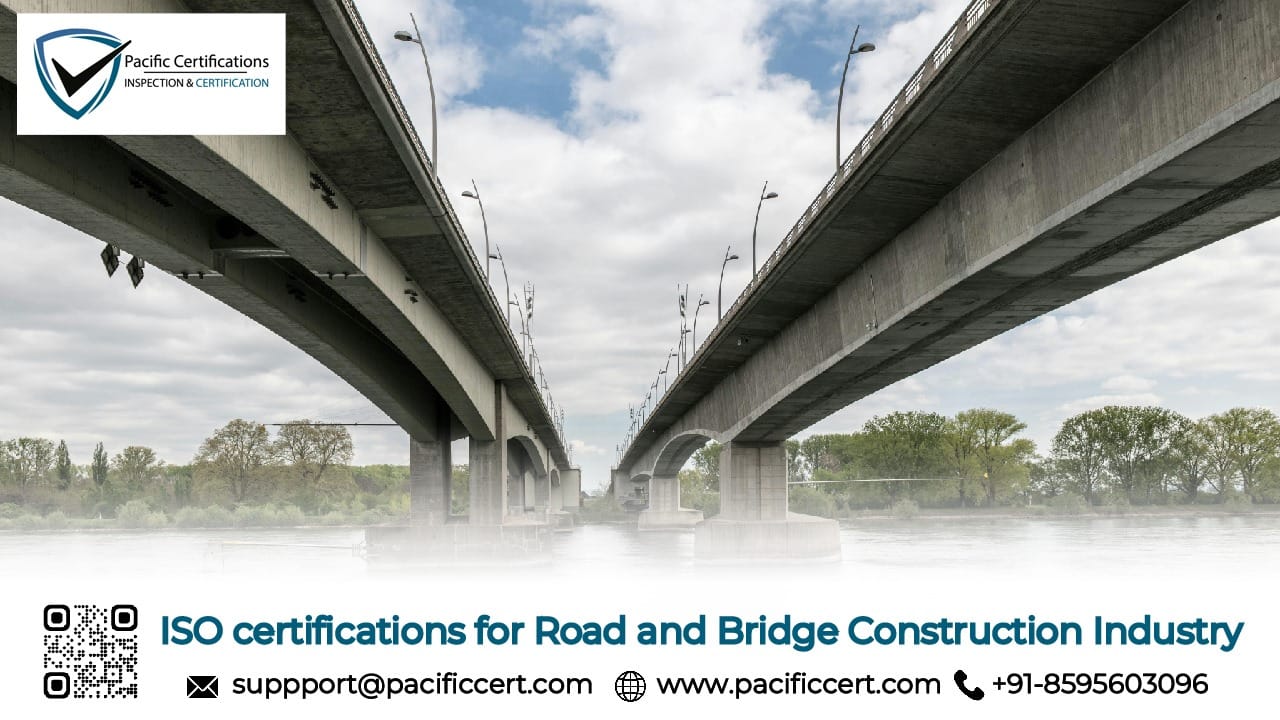ISO Certifications for Road Construction Industry, Requirements and Benefits

Introduction
The road construction industry operates in a safety-critical, capital-intensive, and regulation-driven environment where engineering accuracy, material quality, traffic safety, environmental compliance, and project coordination directly influence public safety, asset life, and economic connectivity. Road construction services include earthworks, subgrade and pavement construction, asphalt and concrete works, bridges and culverts interfaces, drainage systems, road markings, traffic management, maintenance, and rehabilitation across highways, urban roads, rural networks, and infrastructure corridors.
With rising infrastructure investments, stricter safety and environmental regulations, increased public scrutiny, and tighter timelines imposed by authorities and funding agencies, road contractors are under pressure to demonstrate structured governance. Poor workmanship, safety incidents, environmental non-compliance, or weak documentation can result in delays, penalties, rework, and reputational damage. ISO certifications provide an internationally recognized framework to standardize road construction operations, manage risks, ensure safety and environmental responsibility, and strengthen credibility with clients, regulators, and financiers.
In road construction, trust is built on safety, durability, and disciplined execution.
Quick Summary
ISO certifications provide road construction companies with internationally recognized frameworks to manage construction quality through ISO 9001, ensure occupational health and safety through ISO 45001, manage environmental responsibilities through ISO 14001, protect drawings, survey data, and project records through ISO/IEC 27001, ensure continuity of critical construction activities through ISO 22301, and strengthen project and enterprise risk governance through ISO 31000. These standards support compliant delivery, safer worksites, and reliable infrastructure outcomes.
For guidance on selecting the most relevant ISO standards for your road construction operations, contact [email protected].
Applicable ISO Standards for Road Construction Industry
Below are the common ISO standards for Road Construction Industry:
ISO 9001: Quality Management Systems (QMS)
ISO 9001 helps road construction companies standardize project planning, material approvals, construction methodologies, inspections, testing, defect rectification, and handover. It improves consistency across projects, reduces rework, and ensures that road assets meet design specifications, standards, and contractual requirements.
ISO 14001: Environmental Management System
ISO 14001 supports responsible management of environmental aspects such as emissions from machinery, noise, dust, waste materials, water runoff, fuel handling, and land disturbance. It helps road contractors comply with environmental permits and sustainability requirements increasingly imposed by governments and funding agencies.
ISO 45001: Occupational Health and Safety Management System
Road construction involves high-risk activities such as heavy machinery operation, traffic interaction, excavation, night work, and work in adverse weather. ISO 45001 provides a structured framework to identify hazards, manage traffic and site safety, ensure legal compliance, and reduce accidents involving workers and the public.
ISO 27001: Information Security Management System
Road projects rely on sensitive information including design drawings, survey data, geotechnical reports, contracts, schedules, and cost data. ISO/IEC 27001 ensures that project information is protected against unauthorized access, loss, or misuse, particularly when multiple stakeholders and digital platforms are involved.
ISO 22301:2019 – Business Continuity Management Systems
Road construction projects can be disrupted by weather events, supply chain delays, labor shortages, equipment failures, or regulatory changes. ISO 22301 ensures that critical construction activities can continue or recover quickly, minimizing downtime and protecting contractual commitments.
ISO 31000:2018 – Risk Management
ISO 31000 enables road construction companies to systematically identify and manage risks related to safety incidents, material performance, schedule delays, cost overruns, regulatory non-compliance, and stakeholder impacts. It strengthens governance and supports informed decision-making across complex infrastructure projects.
Click here to find out more applicable standards to your industry
What are the Requirements of ISO Certifications for Road Construction Industry?
Road construction companies seeking ISO certification must establish documented management systems and demonstrate consistent implementation across planning, site operations, and governance functions. Key requirements include the following:
ISO 9001:2015 – Quality Management Systems
Document construction planning, execution, inspection, and handover procedures
Define quality objectives aligned with specifications, standards, and client expectations
Control drawings, method statements, inspection records, and test results
Monitor non-conformities, defects, and rework
Manage subcontractor and supplier performance
Conduct internal audits and management reviews
ISO 45001:2018 – Occupational Health & Safety
Identify site-specific and traffic-related hazards
Assess OH&S risks and implement control measures
Ensure compliance with safety legislation and traffic management requirements
Provide safety training, inductions, PPE, and toolbox talks
Establish emergency response and incident reporting procedures
Monitor safety performance and continual improvement
ISO 14001:2015 – Environmental Management
Identify environmental aspects of road construction activities
Control dust, noise, emissions, waste, and runoff
Manage fuel storage, spills, and hazardous materials
Ensure compliance with environmental permits and conditions
Monitor environmental performance and improvement actions
ISO/IEC 27001:2022 – Information Security
Identify and classify construction and project information assets
Conduct information security risk assessments
Implement access controls for drawings and project data
Secure digital platforms and shared documentation
Manage third-party access to sensitive information
Monitor and improve ISMS effectiveness
ISO 22301:2019 – Business Continuity
Identify critical construction activities and dependencies
Conduct business impact analysis (BIA)
Develop continuity and recovery plans
Plan for weather, equipment, supply, and workforce disruptions
Test and review continuity arrangements
Tip:Map one complete road construction lifecycle—from surveys and earthworks to paving, markings, inspections, and handover—against ISO requirements to identify quality, safety, and continuity gaps early.
For assistance in evaluating your road construction operations against ISO requirements, contact [email protected].
What are the Benefits of ISO Certifications for Road Construction Industry?
ISO certifications provide road construction companies with strong operational and commercial advantages, including:
Improved construction quality and road durability
Safer worksites and reduced accident risks
Better compliance with transport and environmental regulations
Stronger control over documentation and approvals
Reduced rework, delays, and cost overruns
Increased confidence from authorities, lenders, and stakeholders
Improved eligibility for public infrastructure tenders
Better management of subcontractors and suppliers
Enhanced environmental responsibility
Long-term business credibility and resilience
Global investment in road infrastructure continues to grow as governments focus on connectivity, logistics efficiency, and economic development. The global road construction and maintenance market is projected to exceed USD 5 trillion in the coming years, driven by urban expansion, highway upgrades, and rehabilitation of aging networks.
At the same time, funding agencies and regulators are placing stronger emphasis on safety performance, environmental compliance, and governance transparency. Road construction companies demonstrating ISO-aligned management systems are better positioned to secure large contracts, meet compliance expectations, and deliver sustainable infrastructure. Looking ahead, ISO certifications including ISO 9001, ISO 45001, and ISO 14001 are anticipated to become baseline expectations for professional road construction service providers operating in regulated markets.
How Pacific Certifications Can Help?
Pacific Certifications, accredited by ABIS, acts as an independent certification body for road construction companies by conducting impartial audits against applicable ISO standards. Our role is to objectively assess whether documented management systems and construction operations conform to international ISO requirements, based strictly on verifiable evidence and records.
We support road construction organizations through:
Independent certification audits conducted in accordance with ISO/IEC 17021
Objective assessment of quality, safety, environmental, and risk controls
Clear audit reporting reflecting conformity status and certification decisions
Internationally recognized ISO certification upon successful compliance
Surveillance and recertification audits to maintain certification validity
Contact Us
For ISO certification for road construction services, contact [email protected]or call +91-8595603096.
Author: Ashish
Read more: Pacific Blogs

